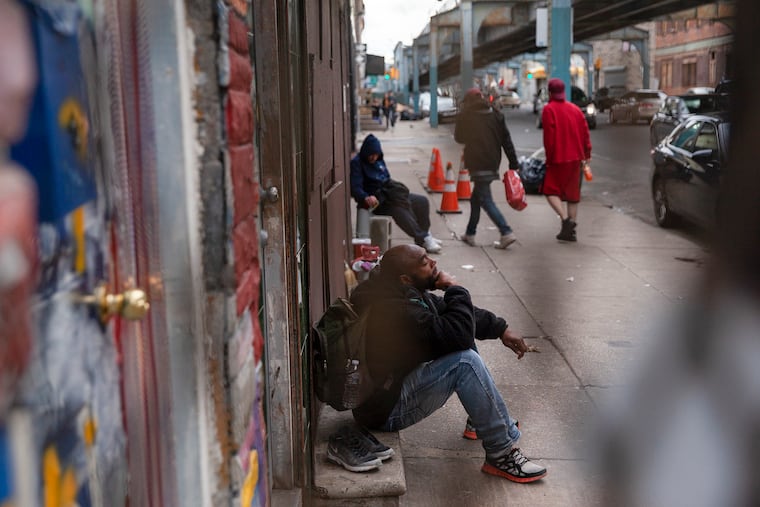Philly’s Kensington neighborhood, hard-hit by opioids, shows support for supervised-injection sites in survey
The survey suggests that many people in Kensington feel positively about the idea — especially if the sites can cut down on public injection and discarded needles, as they have in other countries, researchers wrote.

A Drexel University survey that asked Kensington residents and business owners for their opinions on supervised injection sites found much more support for the idea than in previous citywide surveys.
Researchers surveyed 360 residents, permanent and otherwise; a quarter of respondents were living on the street. Nearly 90 percent told researchers that they supported the opening of a supervised injection site. And 63 percent of the 79 business owners or longtime staff surveyed also supported the idea.
Supervised injection sites, where people in addiction can use drugs under medical supervision, be revived if they overdose, and access treatment, have spurred debate, especially in Kensington, over the last year. Kensington is the neighborhood hit hardest by overdoses and opioid-related homelessness in a citywide crisis where drug overdoses have killed more than 3,000 people in the last three years.
Residents have flooded town hall meetings to decry the sites, and have expressed worries that they will increase drug sales and drug use in a neighborhood that has dealt with successive drug crises for decades.
But the survey, published in the Journal of Urban Health, suggests that many people in Kensington feel positively about the idea — especially if the sites can cut down on public injection and discarded needles, as they have in other countries, researchers wrote.
Researchers set up tables on either side of the street at nine intersections along Kensington Avenue this past winter. They also recruited business owners and staff from more than 70 shops along the avenue.
Participants were asked questions, in English and Spanish, about their experiences concerning drug use in the neighborhood. Then they were read a statement explaining how supervised injection sites operate, followed by a series of questions that asked residents whether they would be in favor of a site if, for example, it was shown to reduce public injection.
Then they were asked a final, broader question: “Are you in favor of an overdose prevention site opening in Kensington?"
“I think that providing people with sufficient information so that they can make a determination is always wise about any issue,” said Alexis Roth, a Drexel assistant professor in community health and prevention and the study’s lead author. “And in this particular case, 64 percent of people had heard of an overdose prevention site before they took the survey. We were working with a group who at least had heard of the concept, even if they didn’t know all of the details.”
She said her team of researchers felt it was important to survey people who live in Kensington, the most likely location for a site, rather than conducting a citywide survey.
Two recent citywide surveys, conducted by the Pew Charitable Trusts and a polling group hired by The Inquirer, suggested less support for supervised injection sites. But those surveys framed the issue quite differently.
The Inquirer poll asked respondents, “Should the city of Philadelphia designate an area where those who wish to inject themselves with illegal drugs are allowed to do so, free from the risk of arrest?”
The Pew survey asked, “Philadelphia is considering creating a safe site where opioid users could take their drugs under medical supervision. Is this something you favor or oppose?
Only 22 percent of respondents told The Inquirer they supported what was described as an arrest-free zone. Half of respondents told Pew they would back a site offering medical supervision.
Roth said the Drexel survey was an important addition to the conversation surrounding the sites.
“It’s important for the community that [the survey] represents the organizations and political entities that serve that” community, she said. “This is a poll of people who are most directly impacted by overdoses, drug-related problems, and the potential opening of an overdose prevention site in their neighborhood.”